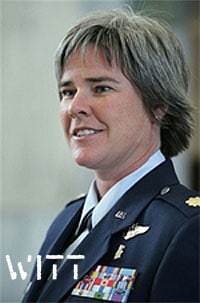The Federal Appeals Court in California on Wednesday reinstated a lawsuit brought by flight nurse Margaret Witt which was dismissed in 2006 and challenged the military's “Don't Ask, Don't Tell” policy.
 Witt had served for 20 years until she was ratted out by a citizen in her home town of Spokane who, according to her attorney, called the Air Force and told them she was living with her female partner there.
Witt had served for 20 years until she was ratted out by a citizen in her home town of Spokane who, according to her attorney, called the Air Force and told them she was living with her female partner there.
The NY Times reports: “Major Witt filed a lawsuit challenging the ‘don't ask, don't tell' policy as a violation of the Constitution's due process and equal protection clauses. In 2006, Judge Ronald B. Leighton, of Federal District Court in Tacoma, Wash., dismissed the case. On Wednesday, a three-judge panel of the appeals court, the United States Court of Appeals for the Ninth Circuit, disagreed, reinstating much of Major Witt's suit and returning the case to Judge Leighton for further proceedings. The decision was notable for the standard the appeals court instructed Judge Leighton to use in considering the case. The panel said judges considering cases claiming government intrusion into the private lives of gay men and lesbians must require the government to meet a heightened standard of scrutiny. The usual standard is called ‘rational basis' review, which merely requires the government to offer a rational reason for a law or policy. The rationale offered by Congress for the “don't ask, don't tell” policy is that openly gay and lesbian service members threaten morale, discipline and unit cohesion. Several courts have sustained the policy as rational. On Wednesday, Judge Ronald M. Gould, joined by Judge Susan P. Graber, ruled that in cases like Major Witt's, the government must go further than simply showing a rational basis for its action, instead proving in each case that an important government interest is at stake and that the intrusion into the plaintiff's private life significantly advanced the interest.”



